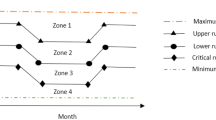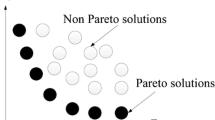Abstract
Management of water resources has become more complex in recent years as a result of changing attitudes towards sustainability and the attribution of greater attention to environmental issues, especially under a scenario of water scarcity risk introduced by climate changes and anthropogenic pressures. This study addresses the optimal short-term operation of a multi-purpose hydropower system under an environment where objectives are conflicting. New optimization models using mixed integer nonlinear programming (MINLP) with binary variables adopted for incorporating unit commitment constraints and adaptive real-time operations are developed and applied to a real life hydropower reservoir in Brazil, utilizing evolutionary algorithms. These formulations address water quality concerns downstream of the reservoir and optimal operations for power generation in an integrated manner and deal with uncertain future flows due to climate change. Results obtained using genetic algorithm (GA) solvers were superior to gradient based methods, converging to superior optimal solutions especially due to computational intractability problems associated with combinatorial domain of integer variables in the unit commitment formulation. The adaptive operation formulation in conjunction with the solution of turbine unit commitment problem yielded more reliable solutions, reducing forecasting uncertainty and providing more flexible operational rules.













Similar content being viewed by others
References
American Society of Civil Engineers — ASCE (2001a) Task committee on artificial neural networks in hydrology, artificial neural networks in hydrology. I. Preliminary concepts. J Hydrolog Eng, ASCE 52:115–123
American Society of Civil Engineers — ASCE (2001b) Task committee on artificial neural networks in hydrology, artificial neural networks in hydrology. II hydrologic applications. J Hydrolog Eng, ASCE 52:124–137
Burn DH, Simonovic SP (1996) Sensitivity of reservoir operation performance to climatic change. Water Resour Manag 10:463–478
Burton H (1998) Reservoir inflow forecasting using time series and neural network models. Master’s thesis. Department of Civil Engineering and Applied Mechanics, McGill University, Montreal
Castelletti A, Pianosi F, Soncini-Sessa R (2008a) Integration, participation and optimal control in water resources planning and management. Appl Math Comput 206:21–33
Castelletti A, Pianosi F, Soncini-Sessa R (2008b) Water reservoir control under economic, social and environmental constraints. Automatica 44:1595–1607
Chaves P, Chang F-J (2008) Intelligent reservoir operation system based on evolving artificial neural networks. Adv Water Resour 31:926–936
Chaves P, Tsukatani T, Kojiri T (2004) Operation of storage reservoir for water quality by using optimization and artificial intelligence techniques. Math Comput Simul 67:419–432
Chen L, McPhee J, Yeh WW-G (2007) A diversified multi-objective GA for optimizing reservoir rule curves. Adv Water Resour 30:1082–1093
Coello CAC (2001) A short tutorial on evolutionary multi-objective optimization. In: Zitzler E, Deb K, Thiele L, Coello CAC, and Corne D (eds) First International Conference on Evolutionary Multi-Criterion Optimization, 21–40. Springer-Verlag. Lecture Notes in Computer Science No. 1993
Collete Y, Siarry P (2003) Multi-objective optimization: principles and case studies. Published by Springer-Verlag, Germany, p 293
Coulibaly P, Anctil F, Bobeé B (2000) Daily reservoir inflow forecasting using artificial neural networks with stopped training approach. J Hydrol 230:244–257
Dhar A, Datta B (2008) Optimal operation of reservoirs for downstream water quality control using linked simulation optimization. Hydrol Processes 22:842–853
di Pierro F (2006) Many-objective evolutionary algorithms and applications to water resources engineering. PhD thesis - School of Engineering, Computer Science and Mathematics, University of Exeter, UK
Dortch MS (1997) Water quality considerations in reservoir management. Water Resour Update 108:32–42
El-Shafie A, Noureldin AE, Taha MR, Basri H (2008) Neural network model for nile river inflow forecasting based on correlation analysis of historical inflow data. J Appl Sci 8(24):4487–4499
Finardi EC, da Silva EL (2005) Unit commitment of single hydroelectric plant. Electric Power Systems Research 75:116–123
Fontane DG, Gates TK, Moncada E (1997) Planning reservoir operations with imprecise objectives. J Water Resour Plann Manag, ASCE 123(3):154–162
IPCC (2007) intergovernmental panel on climate change, climate change, the physical science basis. Cambridge University Press, Cambridge
Karamouz M, Szidarovszky F and Zahraie B (2003) Water resources systems analysis. Published by Lewis Publishers, 608 p
Kişi Ö (2004) River flow modeling using artificial neural networks. J Hydrol Eng 9(1):60–63
Labadie JW (2004) Optimal operation of multireservoir systems: state-of-the-art review. J Water Resour Plan Manag 130(2):93–111
Larijani MA (2009) climate change effects on high-elevation hydropower system in California. PhD thesis - Department of Civil and Environmental Engineering, University of California, Davis
Martin J, Edinger J, Higgins J, Gordon J (2007) Energy production and reservoir water quality: a guide to the regulatory, technical, and theoretical basis for required studies. American Society of Civil Engineers, Reston, p 376
Murata T (1997) Genetic algorithms for multi-objective optimization. PhD thesis, Osaka Prefecture University, Japan
Nandalal KDW and Bogardi JJ (2007) dynamic programming based operation of reservoirs: applicability and limits. international hydrology series, 2nd edn. Cambridge University Press, 144
Neelakantan TR, Pundarikanthan NV (2000) Neural Network-Based Simulation-Optimization Model for Reservoir Operation. J Water Resour Plann Manag 126(2):57–64
Ngo LL (2006) Optimising reservoir operation: A case study of the Hoa Binh reservoir, Vietnam. PhD Thesis - Technical University of Denmark, Lyngby, Denmark
Oliveira R, Loucks DP (1997) Operating rules for multireservoir systems. Water Resour Res 33(4):839–852
Olsson O, Ikramova M, Bauer M, Froebrich J (2010) Applicability of adapted reservoir operation for water stress mitigation under dry year conditions. Water Resour Manag 24(2):277–297
Pahl-Wostl C (2007) Transitions towards adaptive management of water facing climate and global change. Water Resour Manag 21:49–62
Railsback SF, Cada GF, Petrich CH, Sale MJ, Shaakir-Ali JA, Watts JA and Webb JW (1991) Environmental impacts of increased hydroelectric development at existing dams. Martin Marietta Energy Systems Inc and U.S Department of Energy - Environmental Sciences Division, Oak Ridge, Tennessee, Publication No. 3585
Reddy MJ, Kumar DN (2006) Optimal reservoir operation using multi-objective evolutionary algorithm. Water Resour Manag 20:861–878
Sechi GM, Sulis A (2007) Multi-reservoir system optimization using chlorophyll-a trophic indexes. Water Resour Manag 21:849–860
Shirangi E, Reza K, Bajestan MS (2008) A simplified model for reservoir operation considering the water quality issues: Application of the Young conflict resolution theory. Environ Monit Assess 146:77–89
Simonovic SP, Verma R (2008) A new methodology for water resources multicriteria decision making under uncertainty. Phys Chem Earth 33:322–329
Sivapragasam C, Vasudevan G, Vincent P (2007) Effect of inflow forecast accuracy and operating time horizon in optimizing irrigation releases. Water Resour Manag 21:933–945
Sousa T, Jardini JA, de Lima RA (2007) Hydroelectric Power Plant Unit Efficiencies Evaluation and Unit Commitment. Power Tech 2007 Proceedings, Lausanne
Teegavarapu RSV, Simonovic SP (2000) Short-term operation model for coupled hydropower reservoirs. J Water Resour Plann Manag, ASCE 126(2):98–106
Teegavarapu RSV, Simonovic SP (2003) Optimal operation of water resource systems using simulated annealing. Water Resour Manag J 16:401–428
Teegavarapu RSV, Tangirala AK, Ormsbee L (2005) Modeling water quality management alternatives for a nutrient impaired stream using system dynamics and simulation. J Environ Inform 5(2):73–81
Wurbs RA (1993) Reservoir-system simulation and optimization models. J Water Resour Plann Manag 119(4):455–472
Wurbs RA (1997) Reservoir system management. Water Resour Update 108:1–13
Xu ZX, Li JY (2002) Short-term inflow forecasting using an artificial neural network model. Hydrol Processes 16:2423–2439
Yi J (1998) Mixed integer programming approach to optimal short-term unit commitment for hydropower systems. KSCE J Civ Eng 2(3):335–346
Yurdusev MA, O’Connell PE (2005) Environmentally-sensitive water resources planning. Water Resour Manag 19:375–397
Zitzler E, Laumanns M, Bleuler S (2004) A tutorial on evolutionary multi-objective optimization. In: Gandibleux X, Sevaux M, Sörensen K, T’kindt V (eds) Metaheuristics for multi-objective optimisation, vol 535. Springer, Berlin, pp 3–37, Lecture Notes in Economics and Mathematical Systems
Author information
Authors and Affiliations
Corresponding author
Rights and permissions
About this article
Cite this article
Ferreira, A.R., Teegavarapu, R.S.V. Optimal and Adaptive Operation of a Hydropower System with Unit Commitment and Water Quality Constraints. Water Resour Manage 26, 707–732 (2012). https://doi.org/10.1007/s11269-011-9940-9
Received:
Accepted:
Published:
Issue Date:
DOI: https://doi.org/10.1007/s11269-011-9940-9




